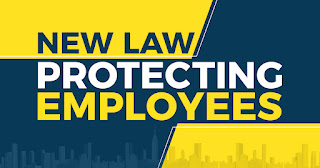Are schools opening in the fall?
It's looking less likely with each passing day as we are experiencing a national death uptick from COVID and it has invaded Major League Baseball.
Even if schools do open, are you comfortable sending your children?
Maybe you are considering hiring an at-home teacher because you can't possibly continue to work, care for your children and play teacher simultaneously.
Before you do, read our 5-Point Plan to do this legally:
1.
Minimum Wage/Overtime/Notice of Pay: Pursuant to the NYS "
Domestic Workers Bill of Rights", an at-home teacher must be paid at least minimum wage for all hours worked. The current minimum wage for workers on Long Island is $13 an hour. Domestic workers must be paid at a rate of time and a half for all hours worked over forty (40) in a given week. In addition, employers must provide a
Notice of Pay Form to the worker at the commencement of employment which includes the employee's regular hourly rate, overtime rate and regular pay day. Employers of domestic workers can face significant damages if they fail to comply with these wage and hour laws, including but not limited to backpay, double damages, and attorneys' fees.
2.
Tracking Hours Worked: Even if you pay a domestic worker for all hours worked in accordance with the law, you can still face liability if you do not accurately and contemporaneously track hours worked. If the employer fails to keep contemporaneous records of hours worked (e.g. sign-in sheets), a court will presume that the employee's account of hours worked is accurate.
3.
Workers Compensation Insurance: If a domestic worker works forty (40) or more hours per week or lives on-premises (e.g. a live-in nanny who also teaches the kids), the worker must be covered by workers compensation insurance. While coverage is not required if the domestic worker works less than forty (40) hours per week, obtaining a policy, even if not required, is advised because it protects you from a personal injury lawsuit brought by the teacher.
4.
Potential Liability for Covid-19 Exposure: Individuals hiring a domestic worker may be exposed to a potential lawsuit if the domestic worker tests positive for Covid-19. While courts have not yet ruled on the admissibility of liability waivers for Covid-19, having a domestic worker sign a waiver that he/she assumes the specific risks associated with exposure to the virus may mitigate exposure. However, gross negligence cannot be waived. Therefore, employers should implement a safety plan including but not limited to: PPE, health screenings, prohibiting people in the house who are symptomatic/have had recent exposure to Covid-19, to mitigate potential liability.
5.
Use of Nanny Cams: While use of nanny cams (i.e. video recording a nanny/at-home teacher without his/her consent) is generally permitted under New York State law, nanny cams may not be installed where a nanny has a reasonable expectation of privacy, (e.g. a bathroom or nanny's bedroom). In addition, recording audio, without the consent of at least one party to the conversation, may constitute a felony pursuant to New York State law.
.jpg)









